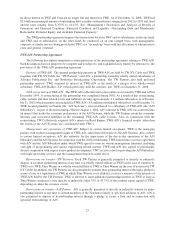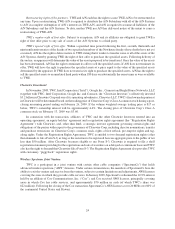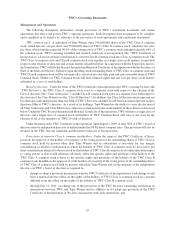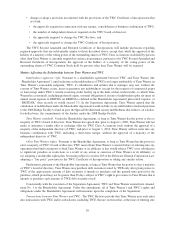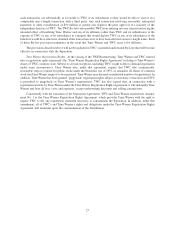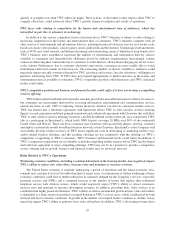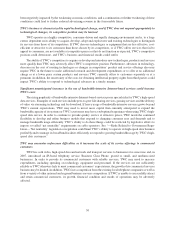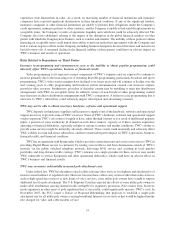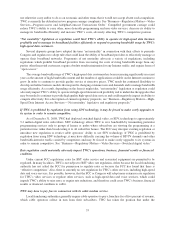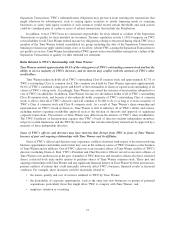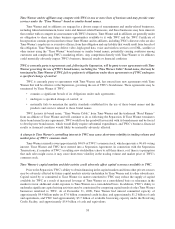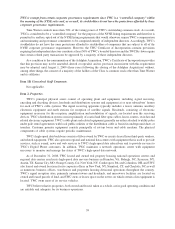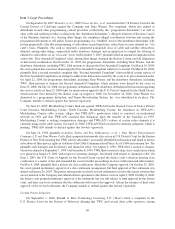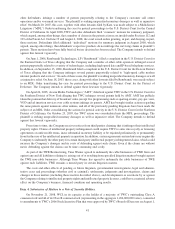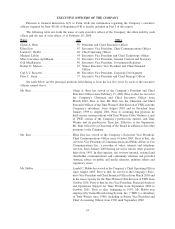Time Warner Cable 2008 Annual Report Download - page 43
Download and view the complete annual report
Please find page 43 of the 2008 Time Warner Cable annual report below. You can navigate through the pages in the report by either clicking on the pages listed below, or by using the keyword search tool below to find specific information within the annual report.experience wide fluctuations in value. As a result, an increasing number of financial institutions and insurance
companies have reported significant deterioration in their financial condition. If any of the significant lenders,
insurance companies or other financial institutions are unable to perform their obligations under the Company’s
credit agreements, insurance policies or other contracts, and the Company is unable to find suitable replacements on
acceptable terms, the Company’s results of operations, liquidity and cash flows could be adversely affected. The
Company also faces challenges relating to the impact of the disruption in the global financial markets on other
parties with which the Company does business, such as vendors and retailers. The inability of these parties to obtain
financing on acceptable terms could impair their ability to perform under their agreements with the Company and
lead to various negative effects on the Company, including business disruption, decreased revenues and increases in
bad debt write-offs. A sustained decline in the financial stability of these parties could have an adverse impact on
TWC’s business and results of operations.
Risks Related to Dependence on Third Parties
Increases in programming and retransmission costs or the inability to obtain popular programming could
adversely affect TWC’s operations, business or financial results.
Video programming costs represent a major component of TWC’s expenses and are expected to continue to
increase primarily due to the increasing cost of obtaining desirable programming, particularly broadcast and sports
programming. TWC’s video service margins have declined over recent years and will continue to decline over the
next coming years as cable programming and broadcast station retransmission consent cost increases outpace
growth in video revenues. Furthermore, providers of desirable content may be unwilling to enter into distribution
arrangements with TWC on acceptable terms. In addition, owners of non-broadcast video programming content
may enter into exclusive distribution arrangements with TWC’s competitors. A failure to carry programming that is
attractive to TWC’s subscribers could adversely impact subscription and advertising revenues.
TWC may not be able to obtain necessary hardware, software and operational support.
TWC depends on third party suppliers and licensors to supply some of the hardware, software and operational
support necessary to provide some of TWC’s services. Some of TWC’s hardware, software and operational support
vendors represent TWC’s sole source of supply or have, either through contract or as a result of intellectual property
rights, a position of some exclusivity. If demand exceeds these vendors’ capacity or if these vendors experience
operating or financial difficulties, especially in light of current economic and market conditions, TWC’s ability to
provide some services might be materially adversely affected. These events could materially and adversely affect
TWC’s ability to retain and attract subscribers, and have a material negative impact on TWC’s operations, business,
financial results and financial condition.
TWC has an agreement with Sprint under which it provides certain functions and services necessary to TWC in
providing Digital Phone service to customers by routing voice traffic to and from destinations outside of TWC’s
network via the public switched telephone network, delivering E911 service and assisting in local number
portability and long-distance traffic carriage. TWC’s reliance on a single provider for these services may render
TWC vulnerable to service disruptions and other operational difficulties, which could have an adverse effect on
TWC’s business and financial results.
TWC may encounter substantially increased pole attachment costs.
Under federal law, TWC has the right to attach cables carrying video services to telephone and similar poles of
investor-owned utilities at regulated rates. However, because these cables carry services other than video services,
such as high-speed data services or new forms of voice services, some utility pole owners have sought to impose
additional fees for pole attachment. The U.S. Supreme Court has rejected the efforts of some utility pole owners to
make cable attachments carrying Internet traffic ineligible for regulatory protection. Pole owners have, however,
made arguments in other areas of pole regulation that, if successful, could significantly increase TWC’s costs. In
November 2007, the FCC issued a Notice of Proposed Rulemaking that proposes to establish a single pole
attachment rate for all utility pole owners carrying broadband Internet access services that would be higher than the
rate charged for video and cable modem service.
33


